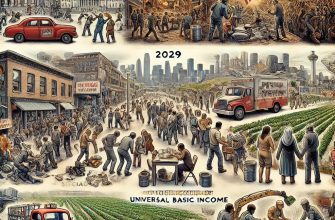1. Introduction to Universal Basic Income (UBI)
What is UBI, and how does it work?
Universal Basic Income (UBI) is a radical yet simple concept: it’s a periodic cash payment provided to every citizen unconditionally and without any strings attached. The idea is that people can afford their essential needs by providing a basic income, reducing poverty and income inequality.
A brief history of UBI
The idea of a basic income has existed for centuries, with early proponents like Thomas Paine and John Stuart Mill advocating for its implementation. Over time, interest in UBI has waxed and waned, but recent concerns about income inequality and job displacement due to automation have brought UBI back into the spotlight.
The rise of UBI as a potential solution
As the wealth gap continues to grow and the threat of automation looms large, more and more people are looking to UBI as a possible solution to these complex problems. In this article, we’ll explore how UBI can address income inequality and job displacement, as well as the challenges and opportunities it presents.
2. Income Inequality and the Need for Universal Basic Income
The growing income gap
Income inequality has been rising for decades, with the rich getting richer and the poor getting poorer. This widening gap between the haves and the have-nots has led to numerous social and economic issues, such as decreased social mobility, reduced access to education and healthcare, and increased crime rates.
UBI as a solution to income inequality
UBI has the potential to significantly reduce income inequality by providing everyone with a basic level of financial security. This would allow people to cover their essential needs, such as food, housing, and healthcare, without relying on welfare programs or low-paying jobs. This could create a more level playing field, offering equal opportunities for all.
3. Automation and Job Displacement: The Role of UBI
The rise of automation
Automation, powered by artificial intelligence and robotics advancements, is rapidly changing how we work. While these technologies have the potential to boost productivity and efficiency, they also threaten to displace millions of workers across various industries.
UBI as a safety net for workers
As more jobs are automated, UBI could serve as a vital safety net for those who lose jobs due to automation. With a basic income, workers would have the financial stability needed to retrain or pursue new career paths without fearing poverty. This would protect individuals and help maintain social cohesion in the face of rapid technological change.
4. UBI Programs and Experiments Around the World
Finland’s Universal Basic Income Experiment
Finland conducted a two-year UBI experiment from 2017 to 2018, providing a select group of unemployed citizens with a monthly basic income. The results showed that participants experienced improved well-being, reduced stress, and increased trust in social institutions.
Alaska Permanent Fund
The Alaska Permanent Fund, established in 1976, is a form of UBI in the United States. The fund distributes an annual dividend to all Alaskan residents, providing a yearly basic income that varies depending on the fund’s performance.
Other UBI pilot programs
Several countries and regions, such as Canada, Kenya, and the Netherlands, have also experimented with UBI programs. These pilot projects have provided valuable insights into the potential benefits and challenges of implementing UBI on a larger scale.
5. Challenges and Criticisms of UBI Implementation
Financial feasibility
One of the main concerns surrounding Universal Basic Income is its financial feasibility. Implementing a universal basic income program would require significant funding, which could lead to increased taxes or a reallocation of resources from other social programs. Critics argue that the costs associated with UBI may outweigh its potential benefits, especially in countries with limited financial resources.
Potential disincentives to work
Another common criticism of UBI is that it could create disincentives to work, as people may choose to rely solely on their basic income rather than seek employment. However, studies and pilot programs have shown mixed results, with some suggesting that UBI does not significantly affect work incentives, while others indicate a slight reduction in work hours.
6. The Future of UBI and Its Potential Impact on Society
The evolving role of work and technology
As automation and artificial intelligence continue to develop and replace human labor in various sectors, the future of work may look significantly different from what we know today. In this context, UBI could serve as a safety net for those who lose their jobs to automation and help them transition to new opportunities. Universal Basic Income could encourage people to pursue more meaningful work or entrepreneurship without fearing financial instability by providing a guaranteed income.
Redefining our values and priorities
The widespread adoption of UBI could lead to a fundamental shift in societal values, with people prioritizing personal well-being, creativity, and community engagement over material wealth and traditional career paths. By alleviating the stress of financial insecurity, UBI might encourage individuals to pursue their passions, engage in lifelong learning, and contribute to society in more meaningful ways.
Strengthening social cohesion
Income inequality has been linked to social unrest, crime, and health disparities, among other issues. By providing a financial safety net for all citizens, Universal Basic Income has the potential to reduce income inequality and promote social cohesion. A more equitable society could improve mental and physical health, reduce crime rates, and increase trust among citizens.
Addressing potential challenges
The successful implementation of UBI will require policymakers to address several challenges. Inflationary pressures may arise due to increased consumer spending, which requires careful monitoring and economic management. It will also be crucial to develop strategies that mitigate any potential disincentives to work, ensuring that UBI complements, rather than replaces, the existing labor market.
Preparing for a global movement
As more countries experiment with and adopt Universal Basic Income programs, we may witness the emergence of a global movement toward a new economic paradigm. By learning from the successes and challenges of early adopters, policymakers worldwide can work together to develop and refine UBI programs that best serve the needs of their citizens and create a more equitable, prosperous future for all.








